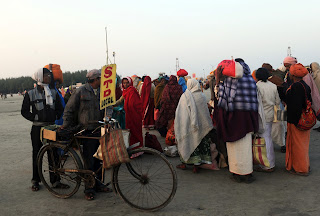Blessings4You is all about your daily need of thoughts, inspiration, motivation, and tips to keep you fit and fine. Aap khush to duniya khush. Chintan karen Chinta hamarey liye chhod den. Always ready to lift you up! Happy Reading!
22 Aug 2012
Fossil Fuel
Fossil Fuel and Renewable Energy Subsidies on the Rise
New Worldwatch Institute report discusses the rise in subsidies for renewable and fossil fuel-based energy production
Washington, D.C.----Total
subsidies for renewable energy stood at $66 billion in 2010, but are
still dwarfed by the total value of global fossil fuel subsidies
estimated at between $775 billion and more than $1 trillion in 2012,
according to new research conducted by the Worldwatch Institute (www.worldwatch.org) for its Vital Signs Online
service. Although the total subsidies for renewable energy are
significantly lower than those for fossil fuels, they are higher per
kilowatt-hour if externalities are not included in the calculations,
write report authors from Worldwatch's Climate and Energy team.
Estimates based on
2009 energy production numbers placed renewable energy subsidies between
1.7¢ and 15¢ per kilowatt-hour (kWh), while subsidies for fossil fuels
were estimated at around 0.1-0.7¢ per kWh. Unit subsidy costs for
renewables are expected to decrease as technologies become more
efficient and the prices of wholesale electricity and transport fuels
rise.
The production and
consumption of fossil fuels add costs to society in the form of
detrimental impacts on resource availability, the environment, and human
health. The U.S. National Academy of Sciences estimates that fossil
fuel subsidies cost the United States $120 billion in pollution and
related health care costs every year. But these costs are not reflected
in fossil fuel prices.
"These so-called
hidden costs, or externalities, are in fact very real costs to our
societies that are not picked up by the polluter and beneficiary of
production but by all taxpayers," said Alexander Ochs, Director of Worldwatch's Climate and Energy program and report co-author.
"Local pollutants from the burning of fossil fuels kill thousands in
the U.S. alone each year, and society makes them cheaper to continue
down their destructive path."
Shifting official
support from fossil fuels to renewables is essential for decarbonizing
the global energy system. Such a shift could help create a triple win
for national economies by reducing global greenhouse gas emissions,
generating long term economic growth, and reducing dependence on energy
imports.
According to
projections by the International Energy Agency (IEA), if fossil fuel
subsidies were phased out by 2020, global energy consumption would be
reduced by 3.9 percent that year compared with having subsidy rates
unchanged. Oil demand would be reduced by 3.7 million barrels per day,
natural gas demand would be cut by 330 billion cubic meters, and coal
demand would drop by 230 million tons of coal. And the effects of the
subsidy removal would extend beyond the end of the phaseout period. By
2035, oil demand would decrease by 4 percent, natural gas by 9.9
percent, and coal demand by 5.3 percent, compared with the baseline
projection.
Overall, carbon
dioxide emissions would be reduced by 4.7 percent in 2020 and 5.8
percent in 2035. The IEA's chief economist recently estimated that eliminating
all subsidies in 2012 for coal, gas, and oil could save as much as
Germany's annual greenhouse gas emissions each year by 2015, while the
emission savings over the next decade might be enough to cover half of
the carbon savings needed to stop dangerous levels of climate change.
"At the same time, a
phase-out of fossil fuel subsidies would level the playing field for
renewables and allow us to reduce support for clean energy sources as
well," said Ochs. "After all, fossil fuels have benefited from massive
governmental backing worldwide for hundreds of years."
Progress toward a
complete phaseout, however, has been minimal. The 2009 pledge by the
Group of 20 major economies to reduce "inefficient fossil fuel
subsidies" has been left vague and unfulfilled. The lack of a definition
has left countries to make their own determination if their subsidies
are inefficient. As of August 2012, G20 countries had not taken any
substantial action in response to the pledge----six
members opted out of reporting altogether (an increase from two in
2010), and no country has yet initiated a subsidy reform in response to
the pledge. Furthermore, there continues to be a large gap between
self-reported statistics and independent estimates in some countries.
Some argue that
reducing subsidies would disproportionately affect the poor. An IEA
survey of 11 developing and emerging countries, however, found that only
2-11 percent of subsidies went to the poorest 20 percent of the
population, showing that subsidies tend to be regressive.
Fossil fuel subsidies
continue to far outweigh support for renewable energy. Although
independent reporting on these subsidies has increased, global efforts
to move forward with subsidy reform have been hindered by a variety of
causes, leaving international pledges unfulfilled.
Further highlights from the report:
- Global production subsidies total an estimated $100 billion per year, and consumption subsidies add to roughly $675 billion.
- In 2010, developing countries spent roughly $193 billion, or 47 percent of all fossil fuel consumption subsidies, on oil, while industrial countries spent roughly $28 billion.
- Since 2007, roughly 80 percent of spending on consumption subsidies occurred in countries that are net exporters of fossil fuels.
Bofors case_ seeking info
'How long should
one wait for getting info in Bofors case?'
For how long should a
citizen wait for information in a case which is pending for more than 23 years,
Chief Information Commissioner Satyananda Mishra asked while slamming CBI for
withholding information in the Bofors pay-offs scam.
The case related to an RTI
application seeking to know the reasons for filing case withdrawal application
against oneof the prime accused, Italian Businessman Ottavio Quattrocchi, in
the Delhi High Court. RTI applicant Ajay Agrawal had also wanted to know from the
CBI about the brief given to the then Additional Solicitor General B Dutta who
went to London in 2005 for de-freezing accounts of Quattrocchi and under whose
orders he visited the United Kingdom.
The CBI said disclosure of
these details could adversely affect its prosecution and the information should
be withheld as per provisions of the RTI Act. "How can giving reasons for
filing withdrawal application in the court have any bearing on the case...You
yourself (CBI) have said in the court that you don't want to pursue the case.
You have made your desire
to drop proceedings public," Mishra asked the CBI. Rajiv Sharma, a CBI
official representing the agency,said the court is yet to decide on the
withdrawal application and the details on the reasons sought by the applicant
contain the strength and weaknesses of the case.
If CBI's position is not
accepted by the court, the weaknesses of the case can be exploited by the
accused to "weaken our prosecution," he said.
"For how long should
a case be pending or the prosecution be continuing after which a resident of
India can exercise the Right to Information? This case has been pending for
last 23 years. By your (CBI) admission you are saying that you want to withdraw
the case because you are not able to get that man," Mishra said.
Mishra also asked the CBI
why it was withholding the details of the brief given to B Dutta.
"Not all the queries
relate to prosecution. For example the visit of Dutta...What was Dutta's brief
and what did Mr Dutta told the court, already being available in public, can have
any effect of prosecution?" he asked.
"At every stage you
are saying every information is part of prosecution...If account of accused is
defrozen with the consent of prosecution, does anybody need any information? In
fact assumption is quite clear that prosecution itself agreed for the
de-freezing of account," Mishra said.
The CBI said regarding
Dutta's brief that some information was collected from Sweden, the United
Kingdom and Switzerland which cannot be made public because of the confidentiality
agreement signed by Indian government with these countries.
Mishra also sought to know
from the CBI if any court has restricted the agency from making information
public in the case to which it replied in the negative. The decision was reserved
and both parties were given time to file further submissions.
21 Aug 2012
Subscribe to:
Posts (Atom)
Bhagwan Shri Krishna Loves You: What are the basis of action?
Hare Krishna! If you want "Shri Krishna Loves You" daily post in your WhatsApp or to be sent to your near and dear ones write yo...

Most_Popular
-
General Elections 2014: Lowest ever Number of Independent Candidates Elected ...
-
Aaj 02-08-2020 ka Panchang, Rakshabandhan Shubh Muhurt, Rashiphal, Samadhan 🌞 ~ *आज का हिन्दू पंचांग* ~ 🌞 ⛅ *दिनांक 02 अगस्त 2...









































.jpg)




































































































.jpg)



































.jpg)




.jpg)































































































































